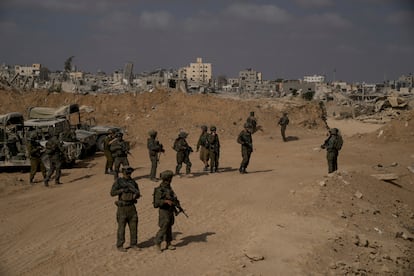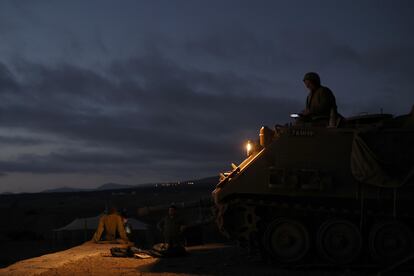The Israeli army’s challenge in the face of an increasingly long war: ‘We are ready for whatever is necessary, for as long as necessary’
Up to 71% of the Israel Defense Forces participating in the Gaza conflict are reservists. Many of them have been transferred to the border with Lebanon after fighting in the Strip

In the war in the Middle East, which will have been ongoing for a year on October 7, up to 71% of the troops that make up the Israeli army — among the 20 most powerful in the world — are reservists. This means that, faced with the enormous military deployment that the invasion of Gaza has entailed, the regular army could not cope with the operation with full-time personnel only and was forced to call up some 360,000 reservists who before the offensive in the Strip were engaged in other tasks and were mobilized in haste. Despite these difficulties, the Israel Defense Forces (IDF) are attempting to close ranks, without displaying outward signs of fatigue or ebbing morale.
Israel has seven open fronts: Gaza, Lebanon, the West Bank, Iran, Iraq, Syria, and Yemen, according to the assessment of Minister of Defense Yoav Gallant. In recent weeks, the main theater of war has shifted from the Strip — where the IDF is fighting Hamas and where Israeli operations have killed more than 41,000 people, according to local health sources — to the northern border with Lebanon, where Hezbollah militias are better prepared and armed than many regular armies and considerably stronger than than the Palestinian resistance in Gaza. Thousands of Israeli soldiers, many transferred from the Strip, are awaiting the order for a ground invasion of Lebanon.
There is no expectation that a ceasefire agreement will be reached in the near future. Nor does anyone know how long a conflict that few imagined would last so long a year ago can continue. Can the IDF withstand the pressure? Does Israel possess enough soldiers, weapons, and a budget to fight for an indeterminate time? Will they limit their pressure on Hezbollah to air strikes and artillery bombardments, or will they end up launching a ground invasion?
Israeli military sources insist that they are prepared morally, materially and in terms of personnel. The IDF does not want to give an impression of weakness or fatigue. “If we have to be in this situation for 10 years, we will be in this situation for 10 years,” says Roni Kaplan, a military spokesman and reservist, without offering details or figures beyond stating that there are hundreds of thousands of people currently engaged in the Armed Forces. Israel, he explains, has invested heavily in defense and its secret services. “We are ready for whatever is necessary, and for as long as necessary,” he stresses.
There is, in any case, a key to maintaining the army and defending the country: the direct support of the United States, Israel’s main ally, which is measured not only in political and diplomatic support, but in billions of dollars in aid every year. “The Americans are helping them with money, as well as with ammunition and materiel,” says retired Lebanese army general Elias Hanna, who does not believe that the problem facing the Israeli army is financial. However, with seven open fronts, Israel “has no choice but to fight,” he points out in a telephone conversation. The retired general adds that fighting Hamas or Hezbollah on their doorstep is not the same as fighting the Houthi rebels in Yemen, over 1,200 miles away.
Washington’s refusal this year to send 1,800 1,000-kilogram bombs and 1,700 500-kilogram bombs for fear that they might be used against civilians in Gaza was, in fact, a gesture to the gallery. Despite the differences that have arisen during the conflict, the close cooperation between the two partners has not been damaged, even under the shadow of the upcoming U.S. elections in November.
Hanna, a professor at several institutions and an expert in security and defense, is in no doubt that the Israeli army is now “weaker” than when the war in Gaza began a year ago. He alludes to the number of dead soldiers, over 700, the wounded, some permanently out of combat, and the psychological damage. He estimates that Israel may eventually have six to seven divisions deployed on the border with Lebanon, comprising between 15,000 and 30,000 troops each, awaiting a possible invasion. In any case, it would be an operation that the former general considers “extremely risky,” and he doubts if Israel will take the step given the high price it will pay.

Technological dependence
“If Israel wants to achieve its goals, it must wage a ground war” in Lebanon, something that is dividing the military establishment of the Jewish state, says Wasef Erekat, an analyst and former Palestinian soldier, referring to the “inability of the army to fight on several fronts at the same time.” His opinion is that Israel is overly dependent on its weapons and technology, which does not translate into effective soldiers on the ground. This has been demonstrated, Erekat believes, by the fact that the IDF has been unable to end the Palestinian resistance in Gaza, where Hamas is fighting with much more “modest” weapons.
Meanwhile, the Israeli parliament is currently debating whether to increase the state budget by 3.4 billion shekels (about $915 million), with the burden of maintaining hundreds of thousands of reservists who have left their jobs, and the cost of supporting tens of thousands of displaced people from towns attacked by Hamas near Gaza and approximately 60,000 people evacuated from the border with Lebanon. The vast majority of reservists who have joined the Armed Forces were called up after the massacre led by Hamas on October 7, 2023, when around 1,200 people were killed in Israeli territory and 250 taken hostage, according to the Israeli authorities.
In just a few hours, Israel spent between four and five billion shekels (between $1.07 billion and $1.34 billion) when in the early hours of April 13 Iran launched some 300 missiles and drone against its territory, according to an estimate by a military officer interviewed by the Yediot Ahronot newspaper. Although Israel had the help of allies such as the United States, the United Kingdom, and Jordan, a large part of the arsenal was intercepted by the Iron Dome anti-aircraft system, a sophisticated apparatus made up of a triple shield at different heights above Israeli airspace. The same system on Tuesday prevented Hezbollah from hitting the Mossad headquarters in the Tel Aviv area.
“Is the Israeli army strong enough to do almost anything it wants in Lebanon and Gaza and wherever else? Yes,” argues Dan Schueftan, director of the Center for National Security Studies at the University of Haifa. He bases his argument on the power of “deterrence,” instilling fear in the enemy so that it refrains from attacking Israel, which claims to have used only a “small” part of its available weaponry.
Surrounded by the damage still visible after a missile strike from Lebanon on Sunday in Kiryat Bialik, on the outskirts of Haifa, one of the most populated and protected areas of the country, Kaplan acknowledges that Hezbollah is expanding the radius of its launches, but insists that this will not alter the Israeli army’s plans. “We are witnessing an attempt by Hezbollah to reach longer-range targets and a huge effort by Israel to prevent it,” he said, referring to the more than 1,300 Hezbollah strikes over the previous few hours.
Under the pressure of the current conflict, Israel “will try to mobilize the whole of society”, says retired Lebanese general Hanna. In this regard, some within Israel have been warning for months about the need to swell the ranks of the IDF in an unprecedented way as the conflict has spread. To this end, touching on a highly sensitive issue, a law has been passed requiring ultra-Orthodox Jews, who until now had been exempt, to join the army. It is a measure that has been imposed in a low-profile manner so as not to incite a community that represents almost 15% of the population of 10 million inhabitants. Nor are Israeli Arabs, who make up around 20%, obliged to do so, although that can of worms has not yet been opened.
Sign up for our weekly newsletter to get more English-language news coverage from EL PAÍS USA Edition
Tu suscripción se está usando en otro dispositivo
¿Quieres añadir otro usuario a tu suscripción?
Si continúas leyendo en este dispositivo, no se podrá leer en el otro.
FlechaTu suscripción se está usando en otro dispositivo y solo puedes acceder a EL PAÍS desde un dispositivo a la vez.
Si quieres compartir tu cuenta, cambia tu suscripción a la modalidad Premium, así podrás añadir otro usuario. Cada uno accederá con su propia cuenta de email, lo que os permitirá personalizar vuestra experiencia en EL PAÍS.
¿Tienes una suscripción de empresa? Accede aquí para contratar más cuentas.
En el caso de no saber quién está usando tu cuenta, te recomendamos cambiar tu contraseña aquí.
Si decides continuar compartiendo tu cuenta, este mensaje se mostrará en tu dispositivo y en el de la otra persona que está usando tu cuenta de forma indefinida, afectando a tu experiencia de lectura. Puedes consultar aquí los términos y condiciones de la suscripción digital.









































